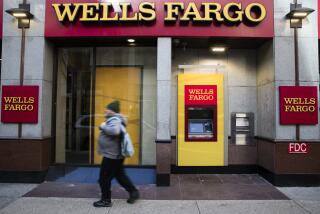Bank Stocks May Prove Profitable Propositions
- Share via
If a handful of seasoned analysts are right, investors in bank stocks may soon have cause to celebrate.
That’s because banks are emerging from the recession profitable and flush with cash. And they’ve got little to do with their money except pay it out to shareholders through stock buybacks and fatter dividends, say bank analysts at the New York investment house of Donaldson, Lufkin & Jenrette.
This rosy analysis is based on the idea that credit-worthy borrowers aren’t desperate for loans, and they probably won’t be for some time. Bankers, turned skittish by past loan problems, are unlikely to start loaning to less credit-worthy folk anytime soon either.
Meanwhile, banks that were once hoarding cash to buy other banks may find that all that stockpiled cash is unnecessary. Several recent mergers have been done through stock swaps, note DLJ banking experts Frank DeSantis and Thomas Brown.
Stock-only mergers tend to be popular because they give the buyer protection from paying too much and the seller a potential for greater profits if the merger works out nicely.
DeSantis and Brown also think that banks will no longer be rewarded for having more cash than they can handle. In the past, banks that had the most cash commanded the biggest stock prices because investors were worried about new regulations that made capital more important.
Once it is clear that banks are generally healthy and sufficiently capitalized, Wall Street will bid up the stock prices of those that use their money wisely rather than stash it, DeSantis said.
In the end, the industry as a whole is likely to boost dividend payouts to about 50% of earnings, DeSantis predicts. (Banks traditionally have paid only 30% to 40% of their earnings to shareholders as dividends, although industrial companies pay out an average of 50%.)
The boosted dividend payout rates will cause an absolute “dividend explosion,” DLJ’s banking duo predicts.
But other analysts are skeptical.
Banks will still hoard cash and keep dividend payouts in the traditional 35% range, says Robert Albertson, banking analyst at Goldman Sachs & Co. But even Albertson thinks that dividends are likely to jump sharply in the near future.
“We do think that bank dividend increases will be sooner than people think and more generous than people think,” he added. There have already been isolated dividend hikes, and more are predicted for the next several weeks, he said. Banks are expected to be boosting dividends willy-nilly by January.
Why? They’ve simply turned the corner, Albertson said. Banks have restructured, cut costs, focused more effectively on profitable businesses. In short, they’ll have more profits to share.
Indeed, if analysts’ earnings projections are on target, corporate profits should be so great in 1993 that a host of banks, ranging from Northern Trust and State Street Boston to Comerica and Wells Fargo will have to raise dividends significantly just to stay within industry norms.
According to DLJ earnings estimates, roughly 23 of the 47 companies the firm covers would have to substantially hike (or establish) dividends next year simply to keep payouts at or above 30% of earnings.
It follows that bank stock prices would also rise if dividends were boosted, experts note. And that should provide investors with generous returns.
Does that mean that you should rush out and buy bank stocks?
Not necessarily.
Investing in bank stocks is somewhat riskier than investing in shares of manufacturers, retailers or virtually any other type of company. That’s because their earnings are contingent on not only the banker’s business savvy but the savvy of his customers as well. At times, even the best bankers with the cleverest corporate clients suffer simply because business conditions have soured.
Or, as one philosophical banker put it: “A bank is only as healthy as the community it serves.”
As a result, banks tend to do well in times of improving economic conditions. But their stock prices--and earnings--tend to go in the tank when the economy goes south.
That makes bank stock prices highly volatile. As a result, investments in bank stocks are probably best reserved for those who are able to take more risk, or who have such long time horizons that they know they won’t have to sell in a market dip.
Finally, some analysts believe that the whole stock market is going into a “corrective phase”--a Wall Street euphemism for a long bout of declining prices.
Even if bank stocks perform better than the market as a whole, some think that returns could be richer in certificates of deposit.
Tom Petruno is on vacation
More to Read
Inside the business of entertainment
The Wide Shot brings you news, analysis and insights on everything from streaming wars to production — and what it all means for the future.
You may occasionally receive promotional content from the Los Angeles Times.









